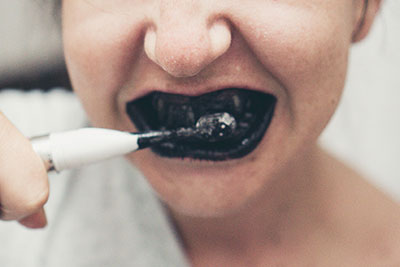Your Options for Dental Veneers
When you’re considering dental veneers, whether that’s for restorative or cosmetic reasons, it’s important to know what your choices are. Veneers are often used to improve the appearance of your smile, and can be used on discolored teeth, broken or chipped teeth, misshapen teeth or teeth with large gaps between them. They can be made from a variety of materials that affect their lifespan and endurance. For more on how veneers work, see our blog on veneers here.
Porcelain & Ceramic Veneers
The toughest, longest-lasting, but also most expensive type of veneer is porcelain or ceramic. Porcelain veneers were the first modern veneers developed in the 1980s, and have been used with great success ever since. Current dental technology has also made it possible for us to create veneers with new types of ceramic material, which may be appropriate depending on the individual patient.
Either ceramic or porcelain veneers are machined using CAD/CAM programs to perfectly match the needs of each tooth. We can even do this in a Same-Day Smile visit, where your veneers are prepared and placed in our office all in one appointment, instead of the usual three. Get in touch with our office to see if that’s a good choice for you.
Traditional porcelain veneers are preferred for cosmetic purposes, because their thin, pristine surface gives such a clean, white appearance. However, if a patient has other challenges of restorative dentistry, like damaged enamel or misshapen teeth, ceramics offer a sturdier, thicker surface that may be the better choice.
Your dentist will evaluate each individual case to determine which is the right material for your veneers. There is no distinguishable difference in the lifespan or function between porcelain and ceramic veneers, and they’re often referred to interchangeably by dentists. These veneers will typically last between 10 and 15 years, and possibly longer with good dental care.
Composite Veneers
Sometimes called no-prep veneers, these are created by your dentist from a material similar to what we use in dental bonding procedures. The composite material is a resin, and softer than ceramic veneers, with a shorter lifespan of five to seven years. However, this material is sometimes chosen because of its comparatively lower price to porcelain veneers. It’s also possible your dentist may combine composite and porcelain veneers depending on your individual dental needs and what may be the best option for each tooth needing a veneer.
Good Veneer Care
Caring for all types of veneers is similar to how you would care for your own natural teeth, with regular and thorough brushing and flossing, accompanied by regular dental cleanings. But there are things you can do to help extend their life, such as not chewing on hard objects like pens, ice or fingernails, not opening packaging or bottles with your teeth, and avoiding chewing hard foods with your front teeth.
It’s also important to wear a mouth guard during sports, or at night, if you tend to grind or clench your teeth while sleeping.
Get in touch with your MPDG dentist if you have questions about whether veneers are right for you, and to find out what he or she might recommend to treat your dental concerns.
See what our happy patients are saying:
Robert W.
I have tried several dentists over years , but, none would compare to team of Ryan Lehr's (D.D.S) office. I would highly recommend you trying them out, you will come away from your visit with a feeling of having found the "Right Team"!
Jennifer S.
I so appreciate the service I receive when I go to Dr. Lehr's Office for my checkups. I think the practice as a whole is much improved by technology and process improvements.
Jeanette N.
It's so nice to be back in Carmel Valley after a five year absence and back to MPDG and the excellent care of Dr. Falkel. It is always a professional, caring experience.






